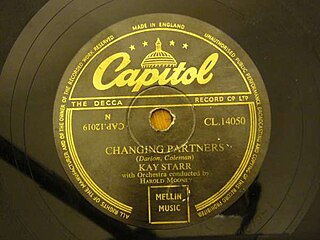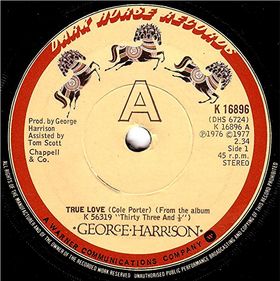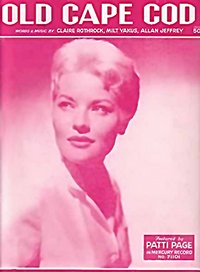Related Research Articles

"Changing Partners" is a pop song with music by Larry Coleman and lyrics by Joe Darion, published in 1953. The best-known recording was made by Patti Page. It was also recorded the same year by Dinah Shore, Kay Starr and Bing Crosby.
"Cherry Pink and Apple Blossom White" or "Cerezo Rosa" or "Ciliegi Rosa" or "Gummy Mambo", is the English version of "Cerisiers Roses et Pommiers Blancs", a popular song with music by Louiguy written in 1950. French lyrics to the song by Jacques Larue and English lyrics by Mack David both exist, and recordings of both have been quite popular. However, Pérez Prado's recording of the song as an instrumental with his orchestra featuring trumpeter Billy Regis, whose trumpet sound would slide down and up before the melody would resume, was the most popular version in 1955, reaching number one for 10 weeks on the Billboard chart. It became a gold record. Pérez had first recorded this title for the movie Underwater! (1955), where Jane Russell can be seen dancing to the song. Prado recorded Cherry Pink several times, the best known version being the original hit recording from 1955 and the 1960 recording in stereo. Billboard ranked the former version as the No. 1 song of 1955. The most popular vocal version in the U.S. was by Alan Dale, reaching No. 14 on the chart in 1955.
"Memories Are Made of This" is a popular song about nostalgia written by Terry Gilkyson, Richard Dehr, and Frank Miller in 1955.

"True Love" is a popular song written by American songwriter Cole Porter, published in 1956. The song was introduced by Bing Crosby and Grace Kelly in the musical film High Society. "True Love" was nominated for the Academy Award for Best Original Song. Kelly's contribution on the record is relatively minor, duetting with Crosby on only the final chorus. Nonetheless, the single is co-credited to her.
"Dark Moon" is a song written by Ned Miller, which was popularized in several different musical formats after its composition. The more popular versions of the song were recorded by Bonnie Guitar and Gale Storm.
"Red Sails in the Sunset" is a popular song. Published in 1935, its music was written by Hugh Williams with lyrics by prolific songwriter Jimmy Kennedy. The song was inspired by the "red sails" of Kitty of Coleraine, a yacht Kennedy often saw off the northern coast of Ireland and by his adopted town Portstewart, a seaside resort in County Londonderry.

"Old Cape Cod" is a song written by Claire Rothrock, Milton Yakus and Allan Jeffrey that was published in 1957. The single, as recorded by Patti Page, became a gold record, having sold more than a million copies. Hailed by Cape Cod natives as the "unofficial Cape Cod Anthem, if ever there was one," the song has been credited with "putting the Cape on the map" and helping to establish Cape Cod as a major tourist destination.

"Melody of Love" is a popular song. The music was originally written by Hans Engelmann in 1903. The lyrics were added by Tom Glazer in 1954.
"Heat Wave" is a popular song written by Irving Berlin for the 1933 musical As Thousands Cheer, and introduced in the show by Ethel Waters.
"I'll Remember Today" is a popular song.

"By The Light of the Silvery Moon" or "By the Light of the Silv'ry Moon" is a popular love song. The music was written by Gus Edwards, and the lyrics by Edward Madden. The song was published in 1909 and first performed on stage by Lillian Lorraine in the Ziegfeld Follies of 1909. It was one of a series of moon-related Tin Pan Alley songs of the era. The song was also used in the short-lived Broadway show Miss Innocence when it was sung by Frances Farr.
"(Love Is) The Tender Trap" is a popular song composed by Jimmy Van Heusen, with lyrics by Sammy Cahn.
"Moonlight Becomes You" is a popular song composed by Jimmy Van Heusen with lyrics by Johnny Burke. The song was written for the Paramount Pictures release Road to Morocco (1942) and published in 1942 in connection with the film. Vic Schoen wrote the arrangement.
"Street of Dreams" is a song and foxtrot composed in 1932 by Victor Young, with lyrics by Sam M. Lewis. There were three successful recordings of the song in 1933 by Guy Lombardo, Ben Selvin and Bing Crosby.
"Hawaiian Wedding Song" originally entitled; "Ke Kali Nei Aua" was adapted from a 1926 love song written by Charles E. King and originally recorded by Helen Desha Beamer in its original version but re-written by Al Hoffman and Dick Manning and renamed as "Hawaiian Wedding Song". The song was recorded by Bing Crosby, Andy Williams and Elvis Presley.
"Takes Two to Tango" is a popular song, written by Al Hoffman and Dick Manning and published in 1952. Two versions of the song, by Pearl Bailey and by Louis Armstrong, charted in that year.

"Oh Lonesome Me" is a popular song written and recorded in December 1957 by Don Gibson with Chet Atkins producing it for RCA Victor in Nashville. Released in 1958, the song topped the country chart for eight non-consecutive weeks. On what became the Billboard Hot 100, it peaked at No. 7. It was Gibson's only Top 10 hit on the pop chart. Its B-side was "I Can't Stop Loving You", which peaked at No. 7 on the C&W Jockey charts and became a standard song about unrequited love. The vocal backings on both songs were provided by the Jordanaires.
"June in January" is a popular song with music by Ralph Rainger and lyrics by Leo Robin, published in 1934.
"The Moon of Manakoora" is a popular song written by Frank Loesser (lyrics) and Alfred Newman (music) for the 1937 Paramount film The Hurricane starring Dorothy Lamour. Lamour sang the song in the film and also made a commercial recording of it. The song "The Moon of Manakoora" is considered a standard and was Loesser's first success as a lyric writer.
"The Best Things in Life Are Free" is a popular song written by the songwriting team of Buddy DeSylva and Lew Brown (lyrics) and Ray Henderson (music) for the 1927 musical Good News. It enjoyed a revival during the period from 1947 to 1950, when it was covered by many artists.
References
- ↑ Selected pressings of the single
- ↑ "Patti Page | Biography, Albums, Streaming Links". AllMusic . Retrieved 28 April 2021.
- ↑ "Discogs.com". Discogs.com. Retrieved October 30, 2017.
- ↑ "Croonin' - Anne Murray | Songs, Reviews, Credits | AllMusic". AllMusic . Retrieved 28 April 2021.